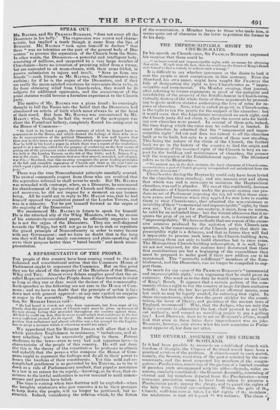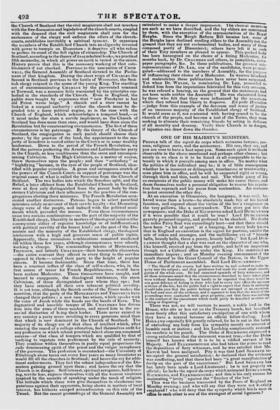THE GENERAL ASSEMBLY OF THE CHURCH OF SCOTLAND.
IF it had been possible to reconcile an established church with freedom of thought, the Church of Scotland would have been a practical solution of the problem. A church-court in each parish, namely, the Session, consisting of the pastor selected by the com- municants, and the most respected lay members of the congre- gation—Presbyteries, consisting of the pastors of a limited number of parishes each accompanied with his elder—Synods, wider re- unions, similarly constituted—the General Assembly, consisting of clerical and lay members deputed from ths Presbyteries—every necessary precaution seems to have been taken to preserve a Presbyterian parity among the clergy, and to guard the rights of the laity from clerical encroachment. Within the pale of the Church, sufficient care is taken for the rights of its members
, the misfurtune is that all beyond are outlaws. The claim
the Church of Scotland that the civil magistrate shall not interfere with the free discussion and legislation of t he church-courts, coupled with the demand that the civil magistrate shall care for the sustenance of the clergy and enforce the edicts of the church- courts, establishes inevitably a spiritual tyranny. It organizes the members of the Established Church into an oligarchy invested with power to trample on Dissenters : it deprives all who refuse to profess its creed of the full rights of citizenship. The Church of Scotland, according to t he theory of its sy ntholical books, is a practical fifth monarchy, in which all power on earth is vested in the saints. History proves that this is the necessary working of that esta- blishment if not checked. Previous to the usurpation of CROM WELL, the General Assembly of Scotland dictated to the Parlia- ment of that kingdom. During the short reign of CHARLES the Second in Scotland previous to the battle of Worcester, the Scot- tish clergy reigned in the name of the young King. The startling act of excommunicating CHARLES by the persecuted remnant at Torwood, was a measure fully warranted by the principles em- bodied in the standards of the Church. Even in England, the public were taught by experience that " new Presbyter is but old Priest wrote large." A church and a state cannot be linked in a coequal authority : either the church must he de- graded into a mere political engine, as is the case with the Church of England, which acknowledges a temporal head,—or it must make the state a servile implement, as the Church of Scotland has done more than once, and would have done since the Revolution but for counteracting ciicumstauces. The first of these circumstances is lay patronage. By the theory of the Church of Scotland, the congregation in each parish should choose their pastor; by the practice of the land, the appointment to the ma- jority of benefices is vested either in the Crown or in some wealthy landowner. Down to the period of the French Revolution, we find the patrons preferring the Arminian and Latitudinarian party in the Church, as less troublesome than the stern and uncompro- mising Calvinists. The High Calvinists, as a matter of course, threw themselves upon the people; and thus " orthodoxy " or "highflying "became, in the eyes of the people of Scotland, iden- tified with popular principles. A gross and outrageous stretch of the powers of the Church Courts in support of patronage was the original cause of what is called the Secession from the Church of Scotland. The two bodies into which the Seceders split, and the Relief, a later offshoot from the Established Church in Scotland, were at first only distinguished from the parent body by their sterner Calvinism and their adherence to the practice of the con- gregations electing their ministers. The French Revolution occa- sioned another distinction. Patrons began to select parochial ministers solely on account of their servile loyalty : the Dissenting clergy were of the people, and imbued with the political senti- ments which pervaded the masses. From these circumstances arose two curious combinations—on the part of the majority of the Established clergy, liberality in matters of theological opinion (the consequence either of superior knowledge or of indifferentism) with political servility of the basest kind ; on the part of the Dis- senters and the minority of the Established clergy, theological intolerance with a high and generous sense of public rights. Apparently, these anomalous combinations remained unaltered till within these few years, although circumstances were silently working a change. The commanding talents of MONCRIEFF, THOMSON, and latterly CHasmses—their honourable chum:less —the entire contrast they offered in every thing to the serviles opposed to them — raised their party to the height of popular esteem. It became fashionable. Since that time, there has been a constant influx of the class of self-seekers, who, in the first access of terror for French Republicanism, would have been zealous Moderates. These timeservers have caught, and learned to exaggerate, the theological intolerance, the stern Calvinism, of those distinguished men whom they ape ; but they have retained all their own inherent political servility. It is not true, although the Scotch scribe of the Times makes the assertion, that the party of the MONCRIEFFS and THOMSONS have changed their politics : a new race has arisen, which speaks with the voice of Jacob while the hands are the hands of Esau. The dogmatical and irascible temper of Dr. CHALMERS has driven him into the arms of these maskers, and raised him to the un- envied distinction of being their leader. There never existed in any country a party more revolting to every generous mind than that which is now dominant in the Church of Scotland. The majority of its clergy are of that class of intellect which, after running the round of a college education, feel themselves unfit for any profession in which robust practical talent alone can command success—of that class of tempers which are qualified by dint of
toadying to vegetate into preferment by the rule of seniority. They combine within themselves in pretty equal proportions the rude domineering spirit of the priest and the vulgar sycophancy
of the parvenu. The profession is overstocked—the University of
Edinburgh alone turns out every four years as many licentiates as would fill all the churches in Scotland; and hence the cry for addi- tional endowments. They feel the robust independence of the Dis- seaters gaining ground upon them; and hence the cry that the Church is in danger. Self-interest, spiritual arrogance, half-learn- ing, servile fear, express themselves with all the wanton virulence inspired by the security of speaking under the mask of religion. The latitude which these men give themselves in slanderous im- putations against their opponents, being shown in matters of local interest, has hitherto escaped animadversion on this side of the Tweed. But the recent proceedings of the General Assembly are
calculated to make a deeper impression. The clerical member* are such as we have described, and the lay elders are nominated by them, with the exception of the representatives of the Royal Burghs. Since the Burgh Reform Bill became law, some of the Burghs have declined sending elders to the Assembly (on the ground that they are not ecclesiastical bodies, and many of them composed partly of Dissenters); others have left it to such of their Tory members as pleased to appear. This packed body has been harangued on the choice of a fitting Moderator, for months back, by Dr. CHALMERS and others, in pamphlets, news. paper paragraphs, &c. In these publications, the grossest mis- representations of Dr. LEE, one of the candidates, were promul- gated—addressed to the members of Assembly, for the purpose of influencing their choice of a Moderator. In wanton falsehood and malevolence these publications have never been surpassed. Yet when Dr. WELSH, in nominating Dr. LEE, proceeded to defend him from the imputations fabricated for this very occasion, be was refused a hearing, on the ground that the statements had not been made within the Assembly v. He was clamoured down by those who felt that they were influenced by the assertions which they refused him liberty to disprove. Ex pede Herculem —judge front this example of the decorum and sense of justice of an immense majority of the Established clergy of Scotland. It would seem as if, not contented with having ceased to be the church of the people, and become a tool of the Tories, they were seeking to alienate their remaining friends by acting in defiance of all morality and decency. Verily their Church is in danger, if injustice can draw down the thunder.



























 Previous page
Previous page